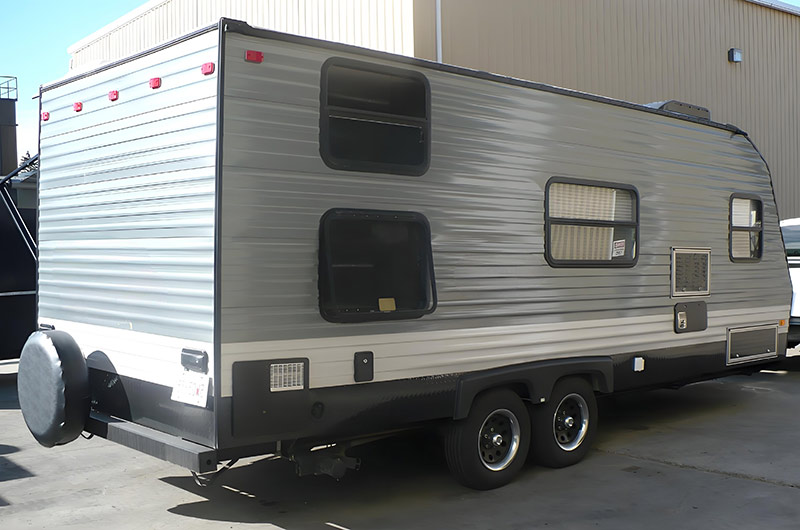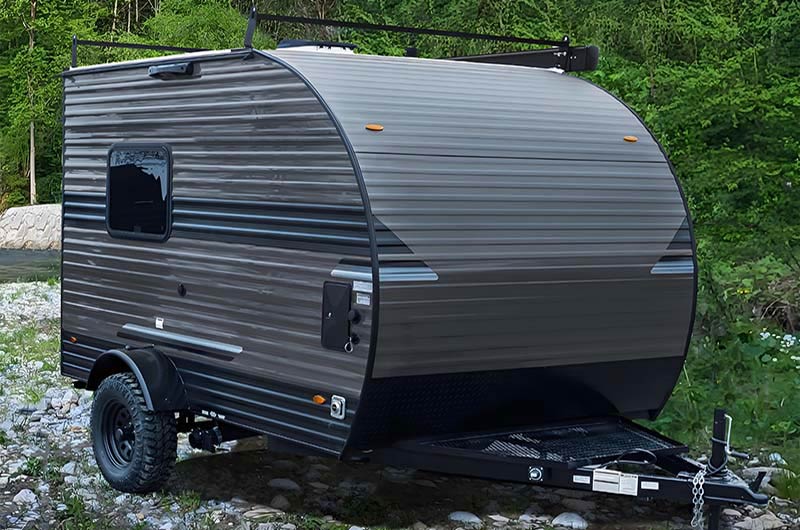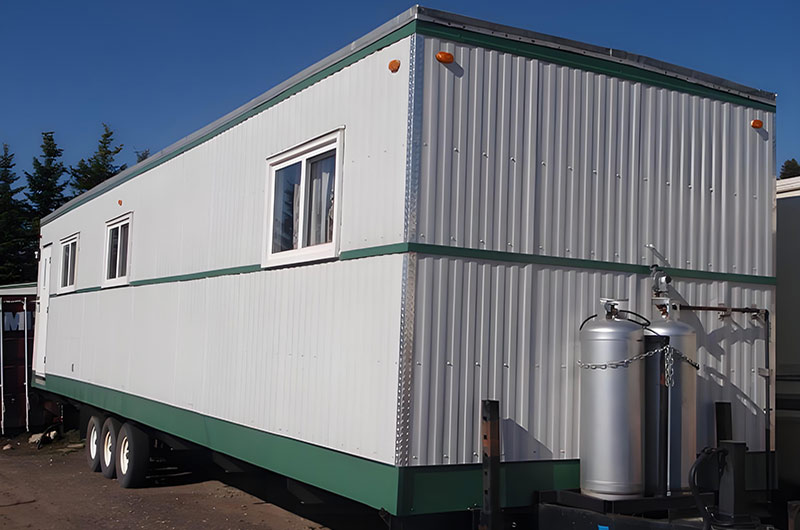Corrugated aluminum trailer panels are a high-quality material that combines lightweight properties, corrosion resistance, and structural strength, widely used in the manufacturing of cargo trailers, containers, and special vehicle bodies.
Due to their lightweight nature, corrosion resistance, and good strength, corrugated aluminum sheets are one of the common choices for trailer side panels, roof panels, or interior linings. Corrugated aluminum trailer panels are commonly used materials in modern trailer manufacturing, featuring advantages such as being lightweight, corrosion-resistant, and high-strength.

Common Aluminum Alloys and Specifications for Corrugated Trailer Panels
- 3003-H14: Most commonly used, good rust resistance, excellent strength, and formability.
- 5052-H32: Higher magnesium content, stronger than 3003, excellent corrosion resistance, especially suitable for marine environments.
- 6061-T6: High strength, can be used for structural components, but not as formable as 3003 and 5052.
- Alloy types: 3003 (general purpose, low cost), 5052 (excellent corrosion resistance, suitable for refrigerated trucks), 6061 (high strength, used for structural parts).
- Thickness: Commonly 0.6-1.0mm for body skins, 1.2-2.0mm for stiffeners or frames.
- Corrugation parameters: Common trapezoidal corrugation height 15-30mm, wavelength 50-100mm, adjustable according to span to optimize stiffness.
Corrugated Aluminum Trailer Panels Specifications
| Parameter | Common Specifications | Remarks |
| Length | 76 inches, 96 inches, 110 inches, 120 inches | 96 inches (8 feet) is the most common standard length |
| Width | 49 inches, 54 inches, 82 inches, 102 inches | 49 inches is the standard width, auto transport trailers typically use 102 inches width |
| Thickness | 0.019 inches to 0.125 inches | Common thickness ranges from 0.032 inches to 0.090 inches |
| Corrugation specifications | 2.5-inch corrugation (0.5-inch corrugation height, 24-inch coverage width) | The most common design, 4-inch corrugation (32-inch coverage width) is suitable for heavy-duty applications |
Corrugated Aluminum Trailer Panels Length Specifications
The standard length specifications for corrugated aluminum trailer panels mainly include:
- 76 inches (approx. 193 cm) Corrugated Aluminum Trailer Panels
- 96 inches (approx. 244 cm) Corrugated Aluminum Trailer Panels
- 110 inches (approx. 279 cm) Corrugated Aluminum Trailer Panels
- 120 inches (approx. 305 cm) Corrugated Aluminum Trailer Panels
These length specifications can meet the needs of different types of trailers, ranging from smaller cargo trailers to large auto transport trailers. 96 inches (approx. 244 cm) is the most common standard length.
Corrugated Aluminum Trailer Panels Width Specifications
The standard width specifications for corrugated aluminum trailer panels mainly include:
- 49 inches (approx. 124 cm) Corrugated Aluminum Trailer Panels
- 54 inches (4'6", approx. 137 cm) Corrugated Aluminum Trailer Panels
- 82 inches (approx. 208 cm) Corrugated Aluminum Trailer Panels
- 102 inches (8'6", approx. 259 cm) Corrugated Aluminum Trailer Panels
49 inches (approx. 124 cm) Corrugated Aluminum Trailer Panels is the most common standard width, while 102 inches (8'6", approx. 259 cm) is used for large cargo trailers or special trailers.
Corrugated Aluminum Trailer Panels Thickness Specifications
The thickness specifications of corrugated aluminum trailer panels vary depending on the application scenario and load requirements:
- 0.019 inches (approx. 0.48 mm) Corrugated Aluminum Trailer Panels
- 0.032 inches (approx. 0.81 mm) Corrugated Aluminum Trailer Panels
- 0.040 inches (approx. 1.02 mm) Corrugated Aluminum Trailer Panels
- 0.050 inches (approx. 1.27 mm) Corrugated Aluminum Trailer Panels
- 0.063 inches (approx. 1.60 mm) Corrugated Aluminum Trailer Panels
- 0.090 inches (approx. 2.29 mm) Corrugated Aluminum Trailer Panels
- 0.125 inches (approx. 3.18 mm) Corrugated Aluminum Trailer Panels
Notes
Trailer panel thickness usually ranges from 0.032 inches to 0.125 inches. The specific choice depends on the trailer’s operating environment and load requirements. Thicker panels provide greater strength and durability but also increase weight and cost.
Aluminum Trailer Panels Corrugation Specifications
The corrugation design of corrugated aluminum trailer panels has a significant impact on their strength and function. Common corrugation specifications include:
2.5" Corrugated Aluminum Trailer Panels
- Corrugation height: 0.5 inches (approx. 12.7 mm)
- Center spacing: 2.67 inches (approx. 67.8 mm)
- Coverage width: 24 inches (approx. 61 cm) for walls, 21.33 inches (approx. 54.2 cm) for roofs
- Material thickness: usually 0.019 inches (approx. 0.48 mm) aluminum or 29 gauge
4" Corrugated Aluminum Trailer Panels
This is an industry standard specification, particularly suitable for heavy-duty industrial and protective applications.
- Material thickness: 0.032 inches, 0.040 inches, and 0.050 inches aluminum, or 24, 22, and 20 gauge
- Coverage width: 32 inches (approx. 81.3 cm)

Corrugated Aluminum Trailer Panels Surface Treatment Options
- Anodizing: Moderate cost, salt spray resistance up to 500 hours, suitable for inland environments.
- Micro-arc oxidation: Hardness HV1500, salt spray resistance over 5000 hours, suitable for coastal or chemical environments.
- Powder coating: Available in colors (such as silver-gray, white), strong weather resistance, suitable for applications with high aesthetic requirements.
Corrugated Aluminum Trailer Panels Material Properties and Core Advantages
Balance of Lightweight and High Strength
The density of corrugated aluminum panels is only 1/3 that of steel (approx. 2.7g/cm³), but with a wave-shaped structural design, their bending stiffness is significantly enhanced. For example, a 0.8mm thick 5052 aluminum alloy corrugated sheet can match the load-bearing capacity of a 1.2mm thick regular steel plate at the same span. This feature reduces trailer self-weight by 10-15%, directly lowering fuel consumption and improving towing efficiency, making it especially suitable for cold-chain transport and urban distribution where fuel economy is critical.
Excellent Corrosion Resistance
The natural aluminum oxide film on the aluminum surface (approx. 0.1-0.2μm thick) resists general atmospheric corrosion, and after anodizing or micro-arc oxidation treatment, the oxide layer thickness can reach 25-50μm, with salt spray test (NSS) exceeding 1000 hours without rust. In high-salt coastal environments, PVDF fluorocarbon coating or nano-sealing treatment is recommended, which can extend service life to over 20 years.
Ease of Processing and Maintenance
The ductility of aluminum alloys makes them easy to cold bend, stamp, and weld. For example, 6061-T6 alloy can achieve weld seam strength up to over 90% of the base material through TIG welding, with relatively low welding deformation. Routine maintenance only requires periodic cleaning, unlike steel which requires frequent rust-proof coating, thereby significantly reducing life-cycle costs.
Corrugated Aluminum Trailer Panels Applications
Typical Application Cases of Corrugated Aluminum Trailer Panels
- Refrigerated Truck: 5052 aluminum alloy corrugated panels combined with polyurethane foam insulation layer reduce the body weight by 30% compared with steel, and resist refrigerant corrosion.
- Curtain Side Trailer: Aluminum corrugated side panels allow quick loading and unloading of goods, combined with high-strength aluminum alloy guide rails, reducing single loading/unloading time by 40%.
- Dump Truck: 6061-T6 corrugated panels treated with micro-arc oxidation maintain surface integrity under sand and gravel impact, extending service life 2 times longer than ordinary steel plates.
Differences in Corrugated Aluminum Panel Sizes for Different Types of Trailers
Different types of trailers have different requirements for the size specifications of corrugated aluminum panels due to their purposes and design requirements. The following is a detailed analysis of the applicable specifications for various trailers:
Cargo Trailer Corrugated Aluminum Panel Specifications
Standard Sizes
- Common Size: 49 inches (width) × 96 inches (length)
- Thickness Range: Usually from 0.032 inches to 0.063 inches, depending on load requirements
- Corrugation Specification: Mostly 2.5-inch corrugation design, with a coverage width of 24 inches
Special Design Considerations
Cargo trailer panels need to have good impact resistance and durability to protect goods and withstand various stresses in daily use. Therefore, cargo trailer panels usually adopt medium-thickness aluminum materials and undergo surface treatment to improve corrosion resistance.
Car Hauler Trailer Corrugated Aluminum Panel Specifications
Dimensional Features
- Width: Usually 8'6" (102 inches, about 259 cm), which is the standard width for car hauler trailers
- Length: Depending on trailer design, common lengths are 24' (288 inches), 28' (336 inches), 30' (360 inches), and 44' (528 inches)
- Thickness: Typically uses thicker aluminum from 0.063 inches to 0.090 inches to withstand greater weight and stress
Special Design Considerations
Car hauler trailers need to carry heavy vehicles, so the panels require higher strength and rigidity. In addition, the internal height of car hauler trailers is usually larger (such as 7'7" or 91 inches), which also affects the design and installation of panels. Some car hauler trailers also adopt special stacking designs (such as double-deck structures), requiring stronger panel support, such as the ATC Stacker ROM 800 model with an internal height of up to 11 feet 4 inches (136 inches).
Agricultural Trailer Corrugated Aluminum Panel Specifications
Dimensional Features
- Width: Agricultural trailer panel width usually ranges from 4'6" (54 inches) to 8'6" (102 inches), depending on the size and use of the trailer
- Length: Common lengths include 10' (120 inches), 16' (192 inches), and 18' (216 inches)
- Thickness: Typically uses thicker aluminum from 0.063 inches to 0.125 inches to withstand various stresses and impacts in agricultural environments
Special Design Considerations
Agricultural trailers are often used in harsh environments, facing dust, dirt, chemicals, and climate changes. Therefore, agricultural trailer panels require stronger corrosion resistance and impact resistance, usually adopting thicker aluminum and special surface treatments. In addition, agricultural trailer panels may need special fastening methods and reinforced structures to meet the special requirements of agricultural operations.
Corrugated Aluminum Panel Specifications for Other Types of Trailers
Dump Trailer
- Dump trailers usually use panel sizes of 7' (84 inches) × 16' (192 inches)
- Panel thickness is usually 0.063 inches to 0.090 inches to withstand the stress caused by frequent loading and unloading operations
- The side panel height of dump trailers is usually 48 inches, which also affects the design and installation of the panels
Tool Trailers and Small Utility Trailers
- These trailers usually adopt smaller panel sizes, such as 4'6" (54 inches) × 8' (96 inches)
- Panel thickness is usually 0.032 inches to 0.040 inches, as the load is relatively light
- Small trailer panels mostly adopt a 2.5-inch corrugation design to balance strength and weight

Selection Considerations for Corrugated Aluminum Trailer Panels
When selecting corrugated aluminum trailer panels, the following points need to be considered:
| Consideration | Description |
| Thickness | Common thickness range: Side panels/roof panels are generally 0.8mm - 1.2mm, floors need to be thicker (such as 2mm-3mm or more). Too thin is prone to deformation, too thick increases weight and cost. |
| Strength | Choose according to trailer type and load requirements. For heavy-duty trailers or those requiring lateral pressure resistance, select higher-strength alloys (such as 5052) or thicker plates. |
| Surface Treatment | Mostly mill finish (natural color), but anodizing or coating (such as powder coating) can also be chosen to enhance corrosion resistance or obtain specific colors. |
| Installation Method | Confirm corrugation pitch, which must match the trailer frame. Usually fixed with riveting or special clips. |
With advantages of lightweight, corrosion resistance, and design flexibility, corrugated aluminum trailer panels have become the preferred material for modern logistics equipment. When selecting, it is necessary to comprehensively consider the application environment (such as salt spray level), load requirements, and regulatory requirements. By optimizing alloy selection, surface treatment, and structural design, their performance and cost-effectiveness can be maximized.
